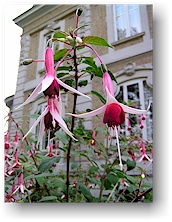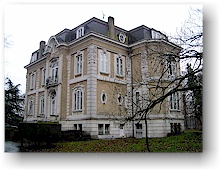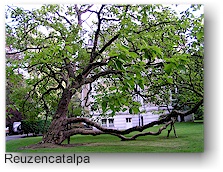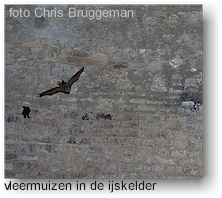
»
Moerkerke castle
» Altena castle
»
Waterhoek chapel
» Sarepta chapel
»
Moerkerke church
» Barrel
canon WWII
» Mon. battle
"Molentje"
»
Leopoldcanal
» Schipdonkcanal

» Castle Ryckevelde
» Castle of Moerkerke
» Castle of Oostkerke |
Castle Altena
 Location: Altenaweg, 8340 Moerkerke [gps] Location: Altenaweg, 8340 Moerkerke [gps]
Accessibility: not accessible (private property)
The history
The area of the castle of Altena was probably already inhabited
in the 13th century. The first written mention of Altena
itself dates back to the 14th century. The story goes that
the chateau finds its origin at the time of Gwijde of Dampierre,
count of Flanders. German soldiers from the count von
Altena fought alongside the count of Flanders against the French
king (1297 - 1302). To show his gratitude, Gwijde granted
this domain to the German soldiers. The count of
Altena had a fief obligation to the Flemish count. The
fiefdom of Altena had an acreage of 19 hectares; the castle with
garden measured about 1 hectare and was surrounded by a ditch.
An old avenue of oak trees gives access to the domain.
 The
castle The
castle
The present castle was built in neo-roccoco style and
dates back to 1927. It was a popular style at that time
but it is very uncommon in the polder area. Remarkable are
the rocailles on the windows and the richly decorated porch.
The mansarde roof leans more towards the baroque style.
The castle was built with money from the reparation fund that
Germany had to finance as compensation for the war damages,
after the previous castle was burnt to the ground in 1918.
The first castle had very modest dimensions; its construction
date is not known (13th or 14th century?). This house
stood there till the beginning of the 18th century. Then
it was replaced by a new chateau with French garden. It
only lasted a good century before a third castle was built by
the end of the 19th century. This third one was erected in
ecclectic style on the order of Thibault de Boesinghe. It
was a so-called "romantic" mansion in an English landscape
garden. It remained until 1918 (see above) but the garden
is still the same.
The garden
 At
the time of the first castle you could hardly speak about a
garden. The largest part of the domain was taken up by an
extensive orchard. It was only in the the 18th century at
the construction of the second castle that a French garden was
laid out. This garden was by defenition a very symetrical
one with perfectly cut hedges and square parterres.
Nevertheless, the orchard kept about 3/4 of its surface. At
the time of the first castle you could hardly speak about a
garden. The largest part of the domain was taken up by an
extensive orchard. It was only in the the 18th century at
the construction of the second castle that a French garden was
laid out. This garden was by defenition a very symetrical
one with perfectly cut hedges and square parterres.
Nevertheless, the orchard kept about 3/4 of its surface.
The current English botanical landscape garden was shaped when
the third mansion was constructed. This garden is now one
of the most remarkable and most exclusive in the area. You
can see here a vast number of indigenous and exotic plants and
trees. A limited list for the amateurs: various species of
oak, beech, lime-trees, chestnut, a giant catalpa, atlascedar,
sequoia, robinia, tree of heaven (ailanthus), Japanese cypress,
yew-tree, medlar,...
 Icehouse Icehouse
In a corner of the domain, there still is an icehouse.
This cellar was built to keep food and beverages cool. Due
to the constant temperature and the excellent isolation it could
be stored for a long time. During winter, ice was cut from
the pond and dumped in the icehouse. This ice could last
until August. The invention of the refrigerator made
the concept of icehouses obsolete. As a consequence, many
icehouses disappeared. This one in Altena survived and is
now a shelter for bats.
|











 |
 Location: Altenaweg, 8340 Moerkerke [gps]
Location: Altenaweg, 8340 Moerkerke [gps] The
castle
The
castle At
the time of the first castle you could hardly speak about a
garden. The largest part of the domain was taken up by an
extensive orchard. It was only in the the 18th century at
the construction of the second castle that a French garden was
laid out. This garden was by defenition a very symetrical
one with perfectly cut hedges and square parterres.
Nevertheless, the orchard kept about 3/4 of its surface.
At
the time of the first castle you could hardly speak about a
garden. The largest part of the domain was taken up by an
extensive orchard. It was only in the the 18th century at
the construction of the second castle that a French garden was
laid out. This garden was by defenition a very symetrical
one with perfectly cut hedges and square parterres.
Nevertheless, the orchard kept about 3/4 of its surface.  Icehouse
Icehouse